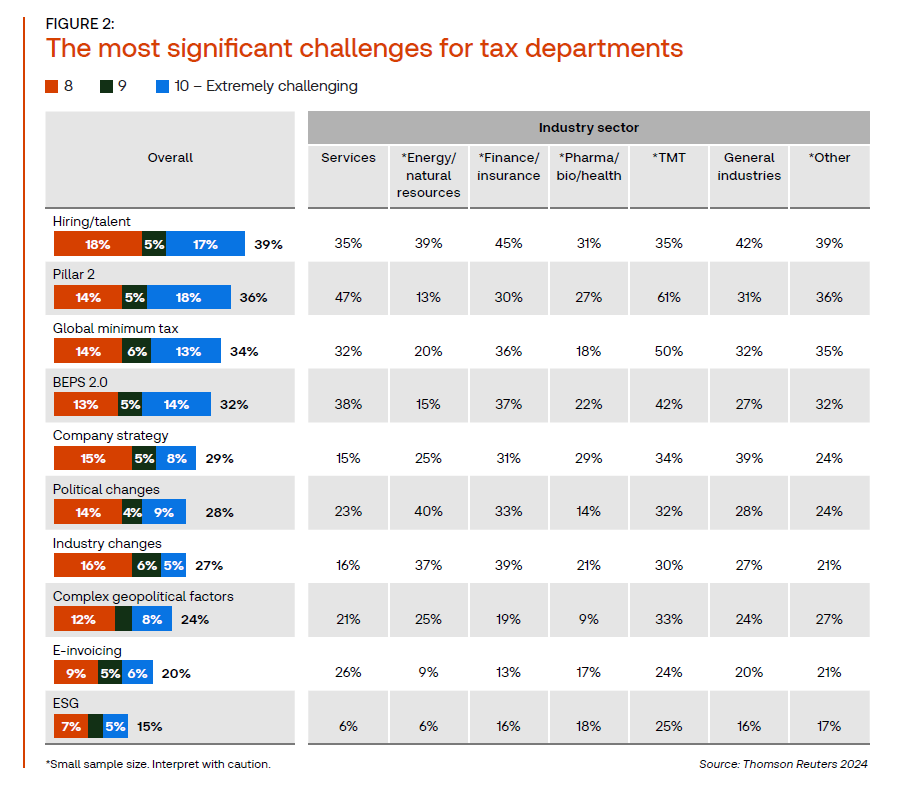In a new report, leaders of in-house tax departments see the need to implement new technologies in order to improve efficiency and allow their departments to be a more-valued partner to the business
While corporate tax departments generally are not expected to be on the cutting edge of technological adoption, there are some department leaders who are harboring an expectation that today’s new technologies could greatly help them with what may be the biggest problem they face: The loss of seasoned talent as a big wave of retirements begins to take its toll.
That sentiment is certainly reflected on the Thomson Reuters Institute’s new 2024 State of the Corporate Tax Department survey report, which showed that many respondents to this year’s survey said that automating work processes and improving efficiency would not only help with the coming talent crunch, but would also allow many in-house tax professionals to do what they strongly wish to do — spend more time on strategic and proactive tasks that could benefit the company in the long run.
This year’s survey report — published annually by Thomson Reuters Institute in partnership with Tax Executive Institute — gathered responses from more than 250 decision-makers within corporate tax departments across several global regions and over a variety of industries.

Key findings
Some of the most critical findings of the report included:
-
-
- Respondents said that talent acquisition is the most significant challenge facing tax departments, noting that compliance with Pillar 2 and the Global Minimum Tax regulations also are significant challenges.
- Respondents said they wish to shift their work balance toward conducting more strategic, proactive work while spending less time on tactical and reactive work. To that end, the top strategic priorities cited by respondents center around ensuring compliance internationally, automating work processes, ensuring proper staffing, and making time for value-added planning.
- Most tax departments (79%) have automated half or less of their work processes, respondents said. More concerning, two-thirds of respondents described their tax departments as reactive or chaotic in their approach to technology. Many also said they feel ill-equipped to make improvements.
-
And while more than one-half of respondents said their internal tax department is under-resourced, which often leaves their company more vulnerable to audits and penalties, an almost equal amount said they expect their departments’ technology budget to increase beyond its usual annual rate in the coming year, indicating a perceived willingness by companies to get their tax functions the modern tools they need to do their jobs more effectively and better deal with the expected loss of talent.
Indeed, much of that hopefulness coming from corporate tax professionals reflected in the report seems to spring from the feeling that new AI-driven technology tools and solutions will allow them to make up for both a lack of personnel and resources. Yet, whether going forward tax department leaders’ optimism will prove well-founded or not may depend less on toll that the wave of Baby Boomer retirements might have on the tax industry and more on whether companies will provide their tax functions with the advanced AI-driven tools they need and the resources to implement them to better overcome these challenges.
As this year’s report clearly demonstrates, many tax department leaders are fully aware of the talent crisis that threatens to swamp their boat, but they are looking proactively for answers among the many tax-specific tech solutions and tools out there in order to keep sailing forward. And they are also looking toward their companies in the hopes management will provide the tools necessary for their in-house tax professionals to do their jobs in the most efficient and effective way possible.
You can download a full copy of the new “2024 State of the Corporate Tax Department” survey report, here, and copy of the United Kingdom version here.






